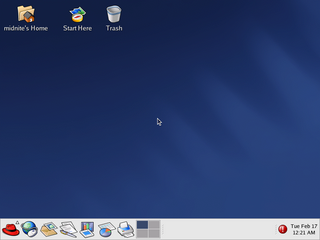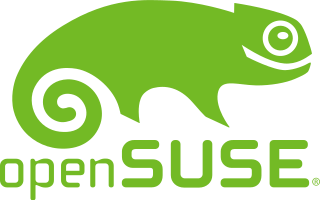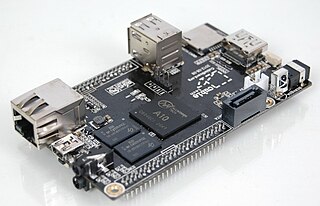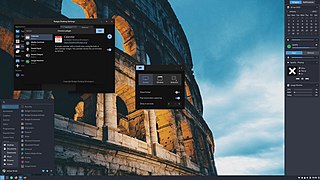
Mandriva Linux is a discontinued Linux distribution developed by Mandriva S.A.

Red Hat Linux was a widely used commercial open-source Linux distribution created by Red Hat until its discontinuation in 2004.

Red Hat Enterprise Linux (RHEL) is a commercial open-source Linux distribution developed by Red Hat for the commercial market. Red Hat Enterprise Linux is released in server versions for x86-64, Power ISA, ARM64, and IBM Z and a desktop version for x86-64. Fedora Linux and CentOS Stream serve as its upstream sources. All of Red Hat's official support and training, together with the Red Hat Certification Program, focuses on the Red Hat Enterprise Linux platform.

A light-weight Linux distribution a Linux distribution that uses lower memory and processor-speed requirements than a more "feature-rich" Linux distribution. The lower demands on hardware ideally result in a more responsive machine, and allow devices with fewer system resources to be used productively. The lower memory and processor-speed requirements are achieved by avoiding software bloat, i.e. by leaving out features that are perceived to have little or no practical use or advantage, or for which there is no or low demand.

Ubuntu is a Linux distribution derived from Debian and composed mostly of free and open-source software. Ubuntu is officially released in multiple editions: Desktop, Server, and Core for Internet of things devices and robots. The operating system is developed by the British company Canonical and a community of other developers, under a meritocratic governance model. As of October 2024, the latest interim release is 24.10, with most-recent long-term support release is 24.04.
Technical variations of Linux distributions include support for different hardware devices and systems or software package configurations. Organizational differences may be motivated by historical reasons. Other criteria include security, including how quickly security upgrades are available; ease of package management; and number of packages available.

openSUSE is a free and open-source Linux distribution developed by the openSUSE project. It is offered in two main variations: Tumbleweed, an upstream rolling release distribution, and Leap, a stable release distribution which is sourced from SUSE Linux Enterprise.

PulseAudio is a network-capable sound server program distributed via the freedesktop.org project. It runs mainly on Linux, including Windows Subsystem for Linux on Microsoft Windows and Termux on Android; various BSD distributions such as FreeBSD, OpenBSD, and macOS; as well as Illumos distributions and the Solaris operating system. It serves as a middleware in between applications and hardware and handles raw PCM audio streams.

Sugar is a free and open-source desktop environment designed for interactive learning by children. It was developed by SugarLabs. Developed as part of the One Laptop per Child (OLPC) project, Sugar was the default interface on OLPC XO-1 laptop computers. The OLPC XO-1.5 and later provided the option of either the Gnome or Sugar interfaces.

Fedora Linux is a Linux distribution developed by the Fedora Project. It was originally developed in 2003 as a continuation of the Red Hat Linux project. It contains software distributed under various free and open-source licenses and aims to be on the leading edge of open-source technologies. It is now the upstream source for CentOS Stream and Red Hat Enterprise Linux.

BLAG Linux and GNU is a discontinued Linux distribution that was made by the Brixton Linux Action Group.

Plymouth is an application which provides a graphical boot experience for Linux. Plymouth supports animations using Direct Rendering Manager (DRM) and the KMS driver. Plymouth is bundled with an initial ramdisk which allows it to run before the file system is mounted. Some sources claim that Plymouth is named after Plymouth Rock, symbolizing the program's role as the first thing a user sees, but this has not been confirmed in any official capacity.

Kiwix is a free and open-source offline web browser created by Emmanuel Engelhart and Renaud Gaudin in 2007. It was first launched to allow offline access to Wikipedia, but has since expanded to include other projects from the Wikimedia Foundation, public domain texts from Project Gutenberg, many of the Stack Exchange sites, and many other resources. Available in more than 100 languages, Kiwix has been included in several high-profile projects, from smuggling operations in North Korea to Google Impact Challenge's recipient Bibliothèques Sans Frontières.

Zim is a graphical text editor designed to maintain a collection of locally stored wiki-pages, a personal wiki. It works as a personal knowledge base and note-taking software application that operates on text files using markdown. Each wiki-page can contain things like text with simple formatting, links to other pages, attachments, and images. Additional plugins, such as an equation editor and spell-checker, are also available. The wiki-pages are stored in a folder structure in plain text files with wiki formatting. Zim can be used with the Getting Things Done method.

Cubieboard is a single-board computer, made in Zhuhai, Guangdong, China. The first short run of prototype boards were sold internationally in September 2012, and the production version started to be sold in October 2012. It can run Android 4 ICS, Ubuntu 12.04 desktop, Fedora 19 ARM Remix desktop, Armbian, Arch Linux ARM, a Debian-based Cubian distribution, FreeBSD, or OpenBSD.

Budgie is an independent, free and open-source desktop environment for Linux and other Unix-like operating systems that targets the desktop metaphor. Budgie is developed by the Buddies of Budgie organization, which is composed of a team of contributors from Linux distributions such as Fedora, Debian, and Arch Linux. Its design emphasizes simplicity, minimalism, and elegance, while providing the means to extend or customize the desktop in various ways. Unlike desktop environments like Cinnamon, Budgie does not have a reference platform, and all distributions that ship Budgie are recommended to set defaults that best fit their desired user experience. Budgie is also shipped as an edition of certain Linux distributions, such as Ubuntu Budgie.

Lumina Desktop Environment, or simply Lumina, is a plugin-based desktop environment for Unix and Unix-like operating systems. It was designed specifically as a system interface for TrueOS and systems derived from Berkeley Software Distribution (BSD) in general, but it has been ported to various Linux distributions.

Deepin is a Linux distribution. It features the Deepin Desktop Environment (DDE), built on Qt and available for a variety of distributions. The Deepin userbase is predominantly Chinese, though DDE is in most prominent Linux distributions' repositories as an alternative desktop environment. The company behind the development, Deepin Technology, a wholly owned subsidiary of UnionTech (统信软件), is based in Wuhan, China.
The Linux kernel can run on a variety of devices made by Apple, including devices where the unlocking of the bootloader is not possible with an official procedure, such as iPhones and iPads.
















